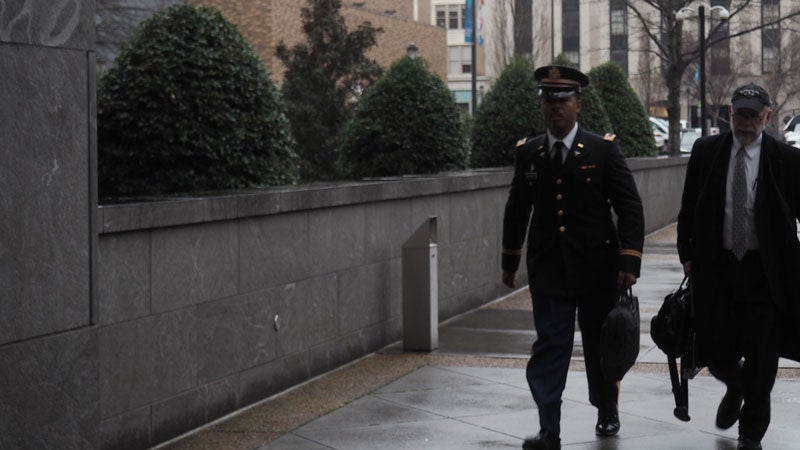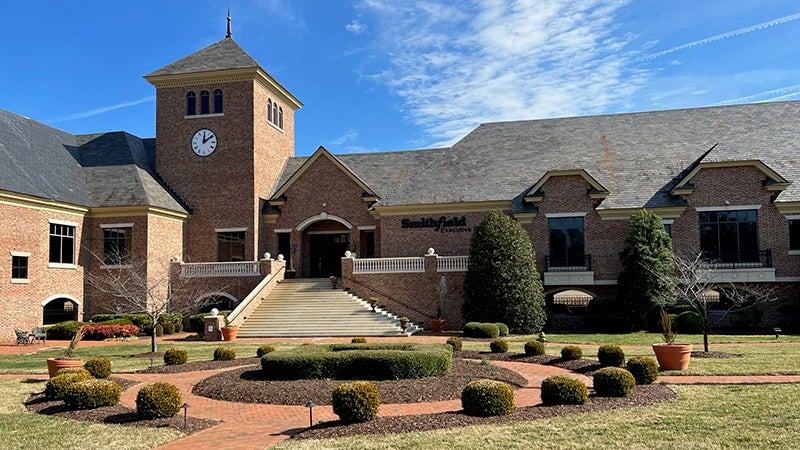Appeals court denies new trial to National Guardsman pepper-sprayed by Windsor police
Published 6:15 pm Tuesday, June 4, 2024

- Virginia National Guard 1st Lt. Caron Nazario with Thomas Roberts, co-counsel to his attorney, Jonathan Arthur (File photo)
When Windsor Police Officer Daniel Crocker attempted to open the driver’s-side door of Virginia National Guard 1st Lt. Caron Nazario’s Chevrolet Tahoe three years ago after pulling him over, Nazario used his elbow to keep the door shut.
That act, combined with Nazario’s prior statements to Crocker and ex-officer Joe Gutierrez about refusing to exit the car, was key to a panel of three federal appellate court judges upholding a Richmond jury’s 2023 verdict awarding Nazario well below the $1 million-plus in damages he’d sought.
The Black and Latino guardsman sued both officers in 2021, ascribing racist motives to their having held him at gunpoint and pepper-sprayed him during the Dec. 5, 2020, traffic stop. The jury, however, awarded Nazario just $3,685 after finding Gutierrez liable for assault – but not battery – and Crocker liable only for having illegally removed a firearm from Nazario’s car.
Nazario’s attorney, Jonathan Arthur, had pushed for a new trial, arguing to the Fourth Circuit appellate panel in March that the wildly lower-than-sought monetary award was the result of U.S. District Court Judge Roderick Young, who’d presided over the trial, having “erred” in instructing the jury that the officers would have been justified in charging Nazario with eluding police and obstructing justice.
Young had granted Crocker and Gutierrez pretrial qualified immunity from Nazario’s claims that the officers had “unreasonably prolonged” the traffic stop, used excessive force and infringed on his free speech right by threatening to arrest him and inform his Army superiors if he didn’t “let this go.” Appellate Judge Robert King, who was appointed by former President Bill Clinton to the bench, authored the May 31 opinion reversing only one of Young’s three qualified immunity rulings.
King’s opinion upholds Young’s ruling that the officers had “probable cause” to pull Nazario over for the expired, temporary New York license plate obscured behind his vehicle’s tinted rear window, but asserts Young erred in finding cause to justify the officers’ suspicion that Nazario was eluding police.
“Nazario was detained for a total of 80 minutes, easily exceeding the length of a normal or reasonable traffic stop. … Any suspicion of eluding that formed in the minds of the Policemen should have dissipated when Lt. Nazario pulled over,” King wrote., adding “the pointing of firearms at Lt. Nazario by the Policemen was unreasonably exacerbated by the verbal death threats made by Gutierrez. Gutierrez’s first explicit threat – telling Nazario that he was ‘fixing to ride the lightning’ – is a colloquial reference to death by the electric chair. … And when Nazario said he was afraid to get out of his vehicle, Gutierrez promptly confirmed his fear, saying that Nazario ‘should be.’”
Despite this, King conceded the officers would have been justified in charging Nazario with misdemeanor obstruction of justice, stating that “although Nazario’s refusal to obey commands to step out of the vehicle can largely be excused by his prudence in keeping both hands raised, Nazario’s conduct of pulling the door shut cannot be excused.”
For this reason “the jury could have still factored the presence of probable cause into their verdict. Therefore, Nazario has failed to show that the erroneous instructions seriously prejudiced his trial, and we will not set aside the verdict,” King wrote.
Appellate Judge Allison Rushing, an appointee of former President Donald Trump to the bench, authored a partial dissenting opinion, stating she would have “affirm(ed) the judgment of the district court in full” on all three rulings by Young granting qualified immunity to the officers.
Arthur and Gutierrez’s attorneys, Coreen Silverman and Jessica Swauger, each did not immediately respond to The Smithfield Times’ request for comments on the ruling.
Crocker’s attorney, Anne Lahren, said: “As counsel for Officer Daniel Crocker, we are pleased that the 4th Circuit Court of Appeals affirmed the trial court findings on all counts. Law enforcement officers must make split-second decisions without the benefit of hindsight and qualified immunity is necessary for them to safely perform their jobs. With regard to Officer Crocker, the appeals court held that he acted appropriately under the circumstances and the trial court’s grant of qualified immunity to him was correctly affirmed in its entirety.”
The trial court, according to Lahren, has yet to rule on which side will pay hundreds of thousands of dollars in legal fees the three parties have collectively accrued since 2021. Arthur, Lahren and Silverman each cited the lower-than-sought jury award in 2023 post-trial court filings. Arthur, on Jan. 31 of last year, filed for $52,692.25 in court costs and another $491,967 in attorney fees, citing laws and civil court procedures that allow the “prevailing party” to recover costs. Nazario, despite the low jury award, is still a prevailing party with regards to Gutierrez being found liable for assault and Crocker for the brief removal of Nazario’s firearm, Arthur contends.
Lahren and Silverman filed their own cost petitions a day after Arthur’s, citing a civil court rule that allows defendants to recover costs from the plaintiff if the awarded damages do not exceed a settlement offer rejected by the plaintiff. Nazario rejected a $150,000 settlement offer – $100,000 from Gutierrez and $50,000 from Crocker – 17 days ahead of the 2023 trial, according to court records.





